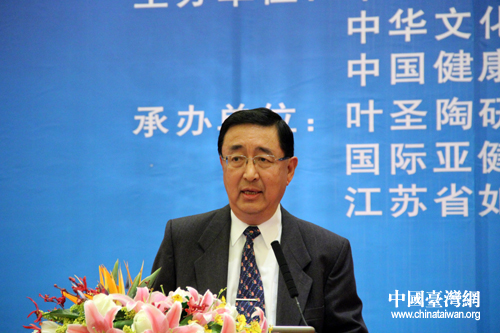Building up a cultural values chain for the great Chinese Dream
 0 Comment(s)
0 Comment(s) Print
Print E-mail China.org.cn, December 6, 2013
E-mail China.org.cn, December 6, 2013
--By Gu Min, Former Director of the Taiwan Center for Chinese Studies & Professor of International Sinological Studies of Tzu Chi University
|
|
|
Gu Min |
The Chinese Dream is a new proposal that combines traditional Chinese values and the development ideas of modern society. It should also form the basis of a common human pursuit in the 21st century.
The Chinese Dream is open-ended. It includes both the dream of Chinese individuals and the dream of collective Chinese engagement. The Chinese Dream is not only an ongoing process within China but also a development model that will be pursued by nations around the world in the future.
The social background of the Chinese Dream is built on modern Chinese cultural identity. In simple terms, modern Chinese culture has provided a new code for creating a set of universal values that derive from traditional Chinese culture and advocate equality for every nation in the world. It is a building block for the road to a new civilization and the common aspiration of Chinese visionaries from the past one hundred years.
As predicted in 1967 by the renowned 20th century British historian Arnold Joseph Toynbee (1889-1975), wisdom for solving 21st century problems must be sought in traditional Confucian culture and Buddhist teachings. The Chinese Dream can be simply an abstract term; it can also form explorations into a new approach for humankind. Whether regarded as an abstract concept or the aspiration to seek common development, the question of how to build a chain of cultural values has become central to a long-term Chinese Dream.
Culture is the foundation for social, economic, scientific, educational and ecological development. It is also a reflection of the success of humankind. Culture is both abstract and concrete. Cultural evolution and identity in many ways provide the basics for development. And the basics in the course of development can popularize human achievements to the masses and create a new trend or tide of culture.
Cultural identity is both visible and invisible. It is the manifestation of accumulated human experiences. Forming a cultural identity is the most complicated, most wide-ranging and most time-consuming socialization process for humankind. Socialization here means national identity and common memory.
If you choose the right time to give the right audience the right lecture with no linguistic barriers and excellent media techniques, you can have a far-reaching influence. It is a feeling of mutual understanding, gratitude and great joy when the people you are appealing to become immersed in the world you have created for them.
We need to create a new global moral code with Chinese element and characteristics free from bias against religion, lifestyle, age, race or gender. These values should be inherently enjoyed and enriched by all. After more than a decade of economic globalization, old-fashioned capitalism is facing a dead end with an appalling gap between the rich and the poor. New ethical values with Chinese elements, such as affluence and compassion, wealth and charity, can bring balance to economic globalization
Building up a chain of cultural values for the Chinese Dream is an enormous project. This essay tries to shed light on the full realization of the Chinese Dream in the sense of cultural development, not only from the Chinese perspective but also from the perspective of global engagement. The essay includes multiple definitions of the Chinese Dream and discussions on it within a framework of domestic and overseas media strategies. Building up a chain of cultural values is proposed in order for the Chinese Dream to progress quicker.







Go to Forum >>0 Comment(s)